Alexander II and his bodyguards
During the Russian-Turkish war 1877-1878. the guard of Emperor Alexander II was carried out by a specially created Guards detachment of the honorary convoy of His Majesty. The emperor warmly treated the ranks of this unusual division, generously rewarded officers and participated in the fate of these people.
When a person of His Imperial Majesty
The detachment was formed by order of Alexander II 2 May 1877, to give an opportunity to the guards to take part in hostilities. Along with His Majesty's Cossack Own escort, the detachment performed the functions of the sovereign’s personal protection. The detachment consisted of a company of infantry, a half-squadron of cavalry and half-company of sapper guards and foot gunners. The company included the lower ranks of all the infantry regiments and battalions of the Guard, as well as three army regiments, where the emperor was the chief. By the same principle, half-squadron and demining half-company were formed. The total strength of the detachment is about 500 people under the command of the outbuilding adjutant, Colonel of the Life Guards Preobrazhensky regiment Peter Ozerov. Needless to say, the officers represented the color of the Russian Guard.
May 15 squad went to war. After examining the detachment in Romania, Alexander II told the officers that he wanted to give them the opportunity to participate in the hostilities. The infantry company was divided by lot "into two lines." June 15 "first turn" took part in the successful crossing of the Danube, and 22 August "second turn" - in the battle of Lovcha.
The detachment was under the emperor until the fall of Pleven, and then, after the return of the monarch to Russia, he served for almost three months at the apartment of the commander-in-chief of Grand Duke Nikolai Nikolayevich. After that, the detachment guarded the emperor in St. Petersburg and the Crimea and 29 was disbanded on November 1878. Again, a similar military unit appeared after the assassination of Alexander II, when it was decided to create a Consolidated Guards Company, which was then deployed in a battalion, and in 1907. - in the regiment 1.
The irretrievable losses of the officers of the detachment were high — one died, two died of wounds, another returned to his regiment and soon also died. In the fate of each emperor took part, not stint neither on awards, nor on signs of attention.
"I feel that I will not return"
The first officer whom the squad lost during the war was Alexander Turbert, 25-year-lieutenant of the Life Guards of the 1 Artillery Brigade. With guards gunners, he was seconded to the 2 mountain battery 2. As a Russian diplomat, Nikolai Ignatiev, who was in the imperial headquarters, wrote: "Turbert is a handsome young man with brilliant talents, a sweet character who complained ... that his special knowledge was not used in artillery fighting. His desire was satisfied" 3.
Turbert was on one of the first pontoons that crossed the river. My lieutenant was overwhelmed with unpleasant premonitions. Nikolai Prescott, a detachment officer, noted: “Shortly before the first flight, I was summoned by Turbert. He was already on the ferry. When I approached him, I was struck by the depression of his appearance, by his fallen spirit. : “I feel that I will not come back.” The poor man predicted his fate, after half an hour he was not alive. When I set sail, a clumsy, heavy ferry went to the other side. ”
The ferry "hardly moved forward and apparently walked past the landing point, descended down the river and came under the nearest fire of a company of Turks occupying the high right bank," one of the boats making up the ferry was punched in several places with bullets and began to fill with water, " besides, some of the horses were injured ... The bank was growing all the time, and finally, with a ferry one side sank into the water and everything went to the bottom of the "4.
Second Lieutenant’s body was found only on June 21 on the shallows of one of the islands of the Danube, the next day the coffin-covered coffin was taken to the Orthodox Church, which was located near the Imperial apartment in Zimnitsy. The 5 front line soldiers were lined up near the church. Ignatiev recalled: "When they sat down at the table ... a funeral march rang out ... and the funeral ringing of the next church: they carried the body ... the Turbert ... His body ... was recognized by his comrades only by his uniform and shoulder straps. His face turned blue, disfigured and swollen, clenched his fist with his teeth ... The sovereign succumbed to one of those magnificent hearty hobbies that are peculiar to him, got up from the table, hurriedly followed the coffin carried by his comrades, entered the church and attended the end of the funeral. "6. As noted by the Minister of War, DA Milyutin, “the burial was touching: in the dilapidated, dilapidated, dark church, an old priest served; the guard engineers, by order of the Sovereign, dug a grave during the funeral service” 7. The emperor himself threw the first shovel in the grave. Later, Turbert's body was transported to Petersburg8.
"The bullet is so firmly stuck in the bone"
When crossing the Danube, the commander of the 34 squadron, Peter Ozerov, was also injured. Ignatiev wrote: "The Guards Company ... suffered a lot. She had to fall under the steepness with which the Turks, who sat down in every bush, were beaten to choose. Our soldiers jumped from the pontoons and without a shot, screaming" Hurray! " those who shot perfectly and defended stubbornly, bravely ... Ozerov ... wounded a bullet in his leg was quite dangerous. His valet, who had served 25 for years, certainly wanted to be with him right away and got a bullet right in the chest, but was saved by a rubber cushion that he carried on his chest under the dress for the master "9.
According to one of the testimonies, from Ozerov’s captivity or death, "a special accident saved him: he lay behind bushes, a drummer and a man of five soldiers were with him ... Suddenly they see ... Turks go towards them, a drummer is found - hit the attack, wounded shouted cheers! And the deceived Turks turned back. " Ozerov for this case was awarded the "Golden weapons"10. 16 June was already visited by the emperor 11 in the hospital. A few days later, Prescott passed the bow from the sovereign Ozerov:" I spent about an hour sitting near the bed of our commander, whom I found in a fairly calm state, but weakened and very thin. The bullet was so firmly stuck in the bone that the doctors decided not to take it out. "
After some time, the colonel returned to the capital, but could not recover from the wound12. Due to the fact that Ozerov could not continue his military service, in April 1879 he was expelled to the retinue of His Imperial Majesty, and 6 died on the same June in Ems (Germany) 13. The body of the colonel was delivered to Petersburg and buried at the cemetery of the Novodevichy Monastery14.
"He was a jewel and inspirer"
In the battle of Lovcha, another officer was severely wounded - 31-year-old staff captain of the Guards Mounted-Artillery Brigade Peter Savvin. Prior to this battle, he had already distinguished himself during the capture of the Russian cavalry of the city of Tarnovo, and then the Guards artillerymen were seconded "to a long-range semi-battery made up of ... repulsed from the Turks ... steel Kruppovsky guns." The guardsmen served two guns, commanded by Savvin15. During the battle, an enemy bullet struck the staff captain in the chest, went right through and “got out in the back near the ridge” of 16. For this battle, the emperor rewarded the wounded man with the Golden Weapon. Officer Konstantin Prezhbyano wrote that the emperor "handed me the Savior St George Belt for me" 17. After 4 of the month, Savvin died at the Red Cross hospital in Kiev, where he arrived from Bulgaria18. As Prezhbyan noted, "he was the decoration and inspirer of our half-battery: they were admired not only by us, the gunners, but by everyone who knew him" 19.
Having received in St. Petersburg the news of the death of the officer, Alexander II ordered that a memorial service be held in his presence in a large palace church, to which all equestrian gunners of 20, who were then in the capital, were called. The body of Savvin was transported to St. Petersburg and buried 21 in the Sergiev Desert (Strelna).
"Give him more cases for combat differences"
The squadron led by the Life Guards of the Pavlovsky Regiment, Konstantin Runov (born in 1839), who led the detachment after wounding Ozerov in less than two months, managed to take part in Lovcha, get the Golden Weapon and join his regiment, which, along with all Guards infantry arrived in Bulgaria. As explained by the official story Pavlovsky regiment, Runov returned to Pavlovsk, "because after production ... the colonel's aide-de-camp Captain von Enden, two colonels turned out to be in the convoy; besides, the Runov was the commander of the regiment's 1 battalion ... His Majesty releases him from his convoy to the regiment, only to give him more cases for the combat differences "22. However, Prezhbyano described it in a different way in his letter: “Of course, a little awkwardness came out, because the head of the Emperor's Honorary Convoy was above the battalion commander. "23.
September 1 Runov signed the last order for the detachment: "Leaving the command of the glorious honorary escort of His Majesty, I can not express my sincere appreciation and deep gratitude to all the officers, the lower ranks sincerely thank you for their zealous and valiant service in battle and beyond Frustrated by the great favors of the sovereign chef, I have at this moment the only regret that I have to part with you friends and comrades "24.
According to the testimony of the writer Countess E. Salias de Tournemire, "his gaze was sad and somehow strangely looking - seeing nothing, remained in my memory so far" 25.
October 12 Pavlovsky Regiment participated in the bloody battle at the Mountain Dubnyak. During the battle, the colonel was with several companies in the 200 steps from the Turkish redoubt. According to the regiment’s history, “The runes decided to attack the redoubt, hoping that even if he manages to bring his people only to the ditch, then the Turks will not dare to stay in close proximity to any significant enemy.”
The runes with a revolver led their subordinates to the stacks of straw that were in 60 steps from the redoubt. However, only a small group reached the straw, the rest had flowed away under fierce Turkish fire. The bullets literally mowed down this group of Pavlovians (straw, of course, could not protect them). At this point, the Russian artillery supporting the attackers fired on Runov and his soldiers. As a result, several people were injured, including the colonel - he broke his left side to the neck. The aide-de-camp was immediately carried on tents to a dressing station where he spent the whole night, after which, despite medical protests, he demanded that he be taken to the redoubt: "Carry me to my fine fellows, I want to die in my battalion." However, only the body of Runov was reported to the redoubt.
When the redoubt was finally taken at the cost of huge losses, Runov and four other officers were buried there in a common grave. October 26, by order of the emperor, the body of Runov was dug. After the funeral, his remains were laid in wooden and iron coffins (the latter was made from a removed roof of a mosque in Dubnjak Mountain) and sent to Petersburg26. In the words of Prezhbyano, “while passing by our Apartment, the coffin was brought to the church, where a requiem was served in the presence of the sovereign. The king wept very much and, while singing“ With Saints Peace ”and“ Eternal Memory, ”was kneeling. The king could not talk about Runov without tears, "eyewitnesses said ... that while walking around the guard and talking about him, the sovereign wept bitterly, saying:" He died on my conscience, as I sent him again to the case "27. Runov was buried at the Smolensk Orthodox cemetery in Petersburg28. In addition to the four above, three more officers died within a few years after the end of the war.
"Stanislasku on chest"
The surviving officers of the squadron did not pass through the many monarchs of mercy. Most received several Russian and foreign orders. Awards were received even by those who did not take part in battles. The artilleryman Konstantin Prezhbyano was ironic about his colleague Alexander Voronovich: "The emperor sent Voronovich to the Gurko detachment ... He rode up just when Telish was taken and flew back with this good news so quickly that the horse was numb, but the report brought the Emperor earlier telegrams , for which he was honored to receive a kiss from the Sovereign and a "stanislachka" on his chest, then, being sent by the Tsar to report this news to the Romanian Karl, he also received from him a "29."
In addition to orders and medals, each of the officers received from the emperor on the nominal saber. It was a reciprocal gift: the fact is that 29 in November 1877, the day after taking Pleven, Alexander II put on a saint of St. George's uniform in honor of his victory (distinctive badge of award-winning Golden Weapon, which was handed over for personal bravery and dedication ). At that moment, Colonel Peter von Enden, who commanded the detachment, was sent the Golden Saber issued from St. Petersburg with the inscription “For Bravery”. December 1 at the general meeting of officers of the detachment, it was decided to bring these weapons to the emperor, which was done the next day (the king greatly appreciated this gift, the saber was with him even during the 1 attempt in March 1881). December 3 emperor departed for Russia. Saying goodbye to the Honorary Convoy, he said: “I thank the officers officers once more for the saber and send it all to me from the saber.” The emperor fulfilled his promise, in April 1878, he personally handed over to the officers of the detachment nominal sabers with memorable inscriptions, and then silver badges "in memory of the stay at His Majesty, during the Turkish war." The badge consisted of the monogram of Alexander II, surrounded by a wreath of laurel and oak leaves, with an imperial crown on top of 30.
The main result of the service in the detachment and close communication with the monarch (the officers ate at the same table with the emperor every day, were repeatedly honored with conversations with him) was a career advancement. Already in June and August 1877, the lieutenant of the army regiments (they were in the detachment due to the fact that their units were patronized) Dmitry Ilyin and Nikolai Volkov were transferred "by the same rank" to the Life Guards Izmailovsky Regiment XXNX. In addition, a large number of detachment officers were counted among the sovereign's retinue. In total, during the period of the detachment's existence (from 31 in May 2 to 1877 in November 29), 1878 officers were appointed as emperor's aide-de-camp, of whom 45 served in the convoy. Two more officers received this rank within 8 months after the dissolution of the 9 squad. But the most striking evidence of the privilege of the convoy was the fact that thirteen of the surviving seventeen officers reached the generals' ranks, and four occupied the posts of governors and vice-governors.
Notes
1. Kopytov S. Two sabers // Old Zeihgauz. 2013. N 5 (55). C. 88-92.
2. Prescott N.E. Memories of experiences in the 1877-1878 war // Journal of the Imperial Russian Military Historical Society. 1911. Prince 5. C. 1-20; Prince 7. C. 21-43 (pg. 4). C. 13.
3. Ignatiev N. Campaign letters 1877 of the year. Letters E.L. Ignatieva from the Balkan theater of operations. M., 1999. C. 74.
4. Prescott N.E. Decree. cit. C. 23, 25.
5. Matskevich N. Guards Detachment of His Majesty's Honorable Convoy to the Turkish War 1877-1878 Warsaw, 1880. C. 79.
6. Ignatiev N. Decree. cit. C. 74.
7. Milyutin D.A. Diary 1876-1878. M., 2009. C. 255.
8. Prescott N.E. Decree. cit. C. 39.
9. Ignatiev N. Decree. cit. C. 59-60.
10. Pages for 185 years: biographies and portraits of former pages from 1711 to 1896. Collected and published by O. von Freiman. Friedrichsgam, 1894-1897. C. 562-563.
11. Milyutin D.A. Diary 1876-1878. C. 251.
12. Prescott N.E. Decree. cit. C. 41.
13. History of the Life Guards Preobrazhensky Regiment. 1683-1883 T. 3. 1801-1883. CH 1. SPb., 1888. C. 349.
14. Grand Duke Nikolai Mikhailovich. Petersburg necropolis. SPb., 1912-1913. T. 3. C. 299.
15. Emperor Alexander II in the 1877 Turkish War (from the letters of KP KP Prezhbyano) // Military-Historical Gazette. 1954. N 3. C. 9.
16. Diary of the Tsar Liberator's stay in the Danube army in 1877. SPb., 1887. C. 163.
17. Emperor Alexander II in the Turkish war 1877 g .... // Military History Gazette. 1953. N 2. C. 24-25.
18. Matskevich N. Guards squad of honorary convoy ... C. 237.
19. Emperor Alexander II in the Turkish war 1877 g .... // Military History Gazette. 1953. N 2. C. 22.
20. Diary of stay ... S. 163.
21. Grand Duke Nikolai Mikhailovich. Petersburg necropolis. SPb., 1912-1913. T. 4. C. 5.
22. History of the Life Guards Pavlovsky Regiment. 1790-1890. St. Petersburg, 1890. C. 303.
23. Emperor Alexander II in the Turkish war 1877 g .... // Military History Gazette. 1954. N 3. C.3.
24. RGVIA.F. 16170. Op. 1. D. 2. L. 68ob.
25. Salias de Tournemire E. Memories of the war 1877-1878. M., 2012. C. 93.
26. History of the Life Guards Pavlovsky Regiment ... S. 315, 322 - 324, 331, 334-335.
27. Emperor Alexander II in the 1877 Turkish War (from the letters of KP KP Prezhbyano) // Military-Historical Gazette. 1954. N 4. C. 44, 46.
28. Grand Duke Nikolai Mikhailovich. Petersburg necropolis. SPb., 1912-1913. T. 3. C. 636.
29. Emperor Alexander II in the 1877 Turkish War (from the letters of KP KP Prezhbyano) // Military-Historical Gazette. 1954. N 4. C. 44-45.
30. Kopytov S. Decree. cit. C. 90-91.
31. Matskevich N. Guards squad of honorary convoy. C. 4-5.
32. Centenary of the Ministry of War. 1802-1902. Imperial main apartment. The history of the sovereign retinue. The reign of Emperor Alexander II. Applications. SPb., 1914. C. 264-272.]
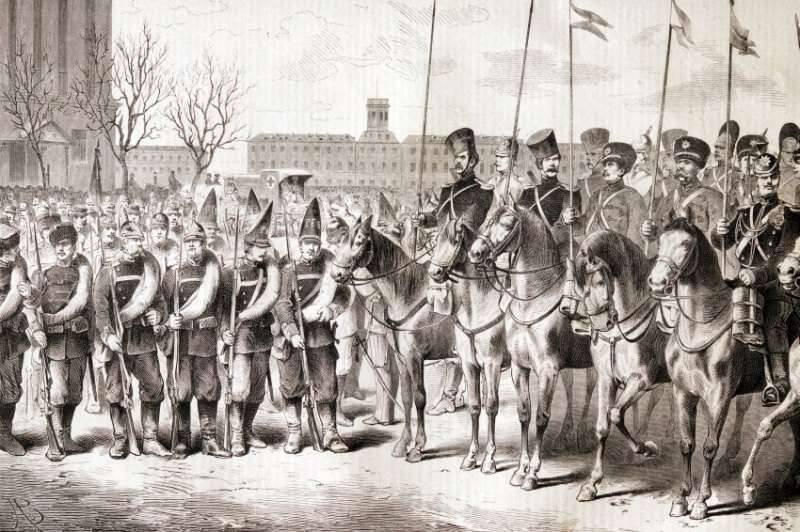
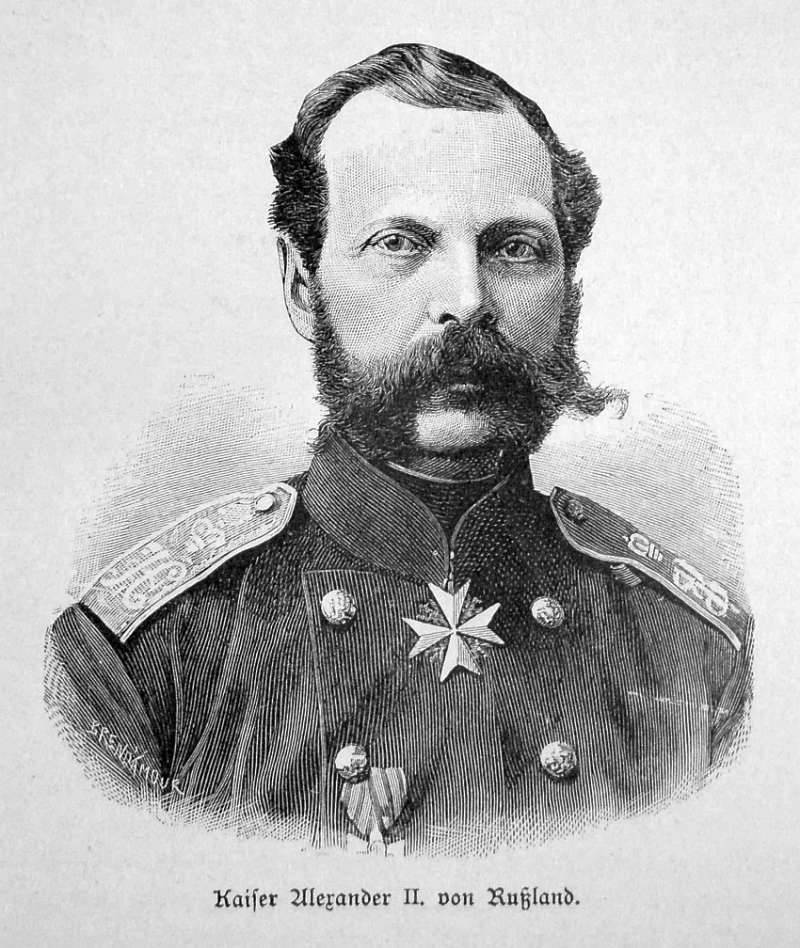
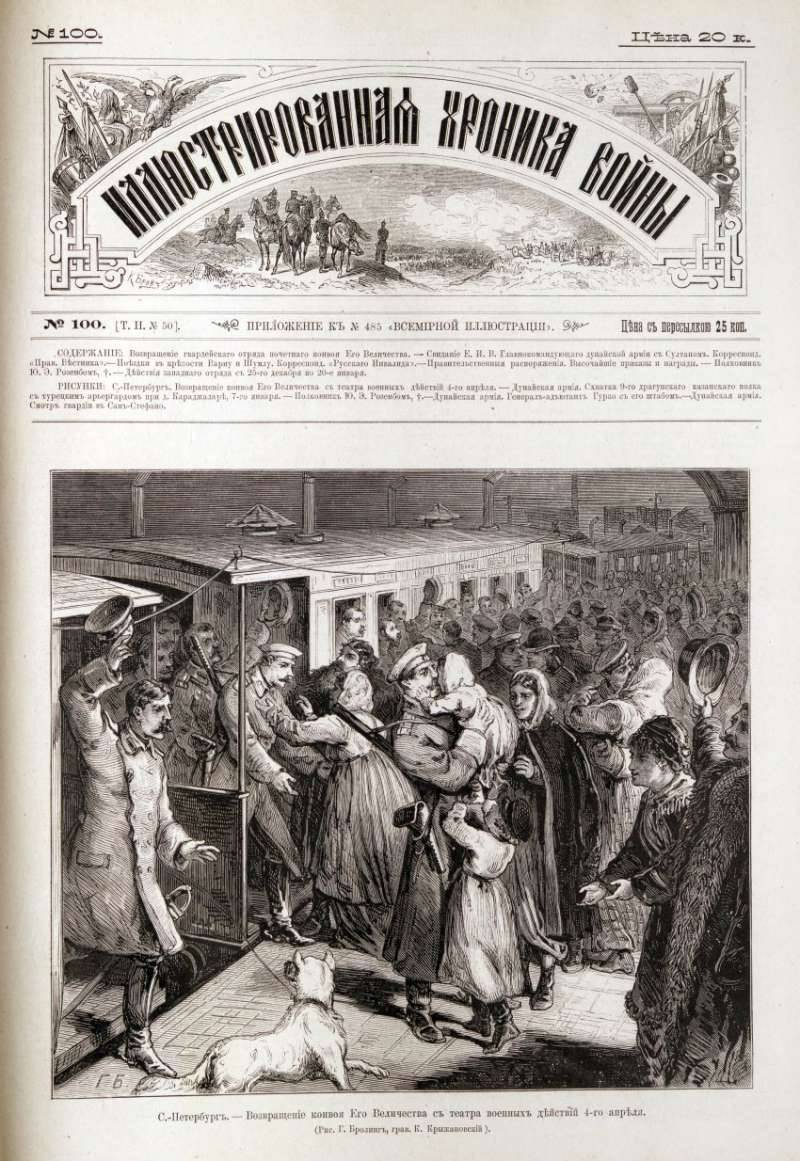
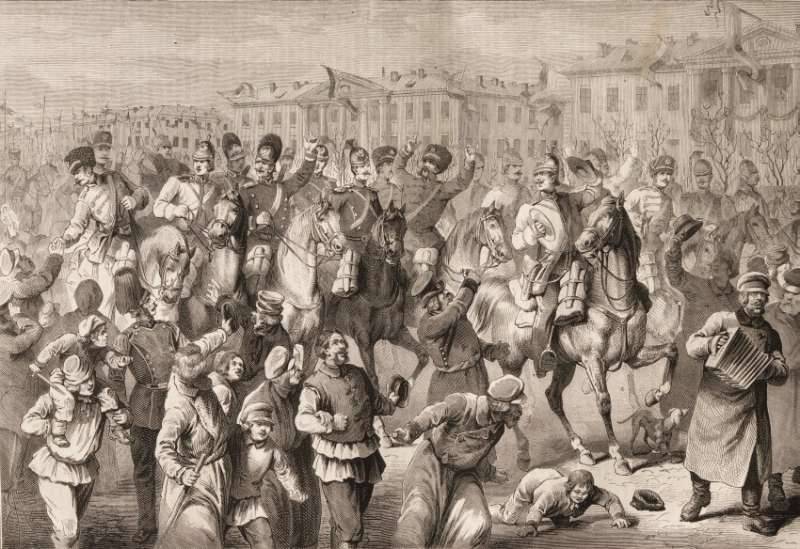
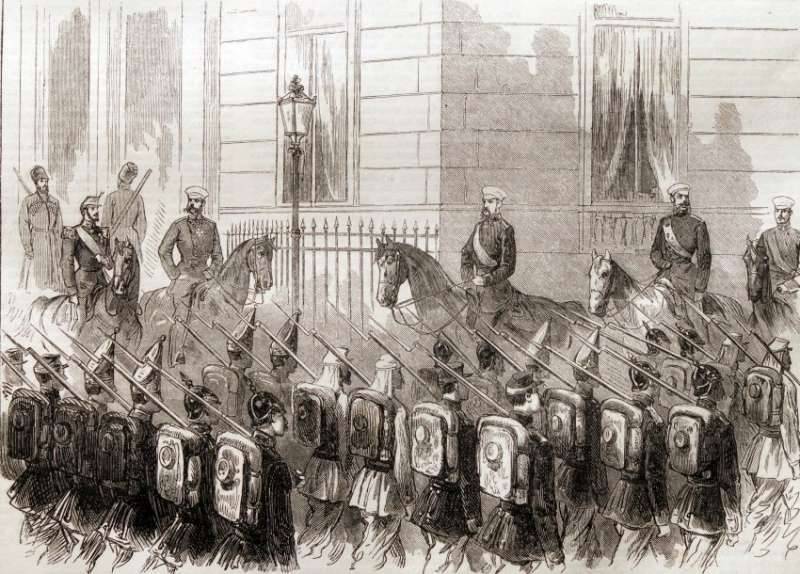
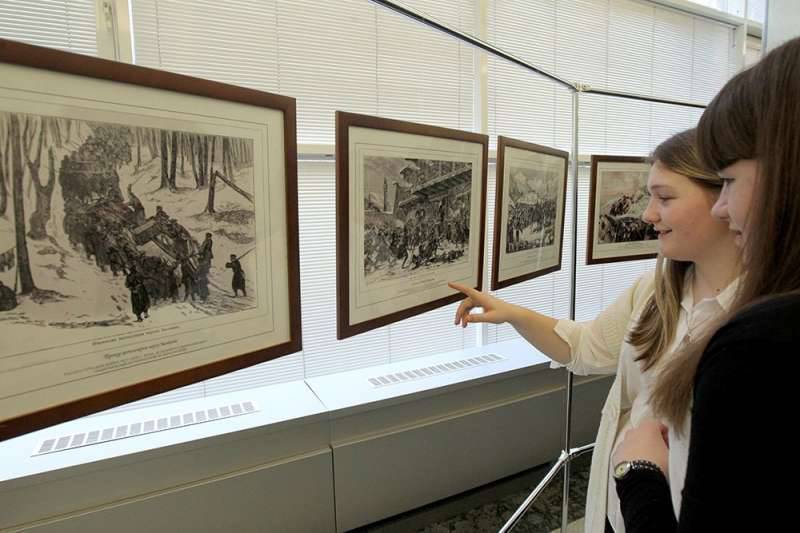
Information